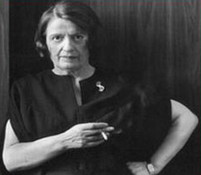
The New Yorker created this outrageously funny send-up of Ayn Rand as a children’s movie reviewer. In this piece, Rand takes several new and some classic children’s films apart, and reviews them through the special lens of her snarky, selfish philosophy.
There is no room for fantasy in Rand’s world of Objectivity , a glitch which shoots down any number of films immediately. Films which elicit an emotional response or teach a lesson receive an emphatic red mark, particularly if someone has foolishly hampered their own success for the good of someone else…Or worse yet, for the many. Read on and learn why ‘Old Yeller’ received high praise (and no tears) while ‘Snow White’ was such a ninny that Rand could not finish watching the film. I’m disturbed to say that Rand actually liked ‘Garfield’ – and cats in general, thanks New Yorker.
“Snow White and the Seven Dwarfs”
An industrious young woman neglects to charge for her housekeeping services and is rightly exploited for her naïveté. She dies without ever having sought her own happiness as the highest moral aim. I did not finish watching this movie, finding it impossible to sympathize with the main character. —No stars.
“Bambi”
The biggest and the strongest are the fittest to rule. This is the way things have always been. —Four stars.
“Old Yeller”
A farm animal ceases to be useful and is disposed of humanely. A valuable lesson for children. —Four stars.
“Lady and the Tramp”
A ridiculous movie. What could a restaurant owner possibly have to gain by giving away a perfectly good meal to dogs, when he could sell it at a reasonable price to human beings? A dog cannot pay for spaghetti, and payment is the only honest way to express appreciation for value. —One star.
“101 Dalmatians”
A wealthy woman attempts to do her impoverished school friend Anita a favor by purchasing some of her many dogs and putting them to sensible use. Her generosity is repulsed at every turn, and Anita foolishly and irresponsibly begins acquiring even more animals, none of which are used to make a practical winter coat. Altruism is pointless. So are dogs. A cat is a far more sensible pet. A cat is objectively valuable. —No stars.
“Mary Poppins”
A woman takes a job with a wealthy family without asking for money in exchange for her services. An absurd premise. Later, her employer leaves a lucrative career in banking in order to play a children’s game. —No stars.
“Willy Wonka & the Chocolate Factory”
An excellent movie. The obviously unfit individuals are winnowed out through a series of entrepreneurial tests and, in the end, an enterprising young boy receives a factory. I believe more movies should be made about enterprising young boys who are given factories. —Three and a half stars. (Half a star off for the grandparents, who are sponging off the labor of Charlie and his mother. If Grandpa Joe can dance, Grandpa Joe can work.)
“How The Grinch Stole Christmas”
Taxation is also a form of theft. In a truly free society, citizens should pay only as much as they are willing for the services they require. —Three stars.
“Charlotte’s Web”
A farmer allows sentimental drawings by a bug to prevail over economic necessity and refuses to value his prize pig, Wilbur, by processing and selling him on the open market. Presumably, the pig still dies eventually, only without profiting his owners. The farmer’s daughter, Fern, learns nothing except how to become an unsuccessful farmer. There is a rat in this movie. I quite liked the rat. He knew how to extract value from his environment. —Two stars.
“The Muppets Take Manhattan”
This movie was a disappointment. The Muppets do not take Manhattan at all. They merely visit it. —No stars.
“Beauty and the Beast”
A young woman rejects a financially independent hunter in favor of an unemployed nobleman who lives off of the labor of others. Also, there are no trains in this movie. I did like the talking clock, who attempted to take pride in his work despite constant attacks on his dignity by the candlestick. The candlestick did not take his job seriously. —Two stars.
“The Little Mermaid”
A young woman achieves all of her goals. She finds an object of value—in this case, a broad-chested brunet man—and sacrifices as much as she believes necessary (the ocean, talking, etc.) in order to acquire him. —Four stars.
“Babe”
Another pig farmer fails to do his job. —No stars.
“Toy Story”
At last, a full-length feature about the inherent value of possessions. —Four stars.
“Garfield”
I liked this movie. Cats are inherently valuable animals. It makes sense that there should be a movie about a cat. I could demonstrate the objective value of a cat, if I wanted to. —Four stars.
“Up”
A man refuses to sell his home to serve the convenience of others, which is his right as an American citizen. He meets a dog, which neither finds food for him nor protects him from danger. He would have been better off with a cat. There are no cats in this movie. —Two stars.
“Frozen”
An exceptional woman foolishly allows her mooching family members to keep her from ruling a kingdom of ice in perfect solitude. She is forced to use her unique powers to provide free entertainment for peasants, without compensation. I liked the snowman, when he sang. —One star.